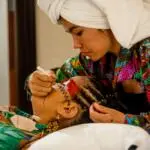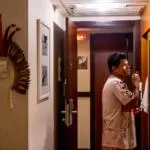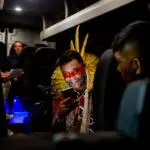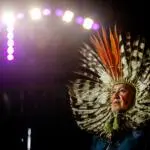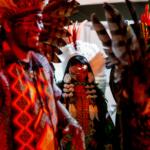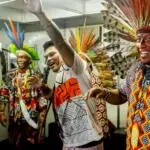In the mid-20th century, the Yawanawá lived as exploited laborers in the rubber plantations of Acre, in the southwestern Amazon Rainforest. Starting in the 1980s, they began reclaiming their ancestral culture and reoccupying their traditional territory, in a struggle that culminated in the demarcation of the Rio Gregório Indigenous Territory. They drove out the rubber tappers, loggers, cattle ranchers, and Evangelical missionaries, the latter because of their opposition to ancient rituals involving the consumption of ayahuasca. A drink made of two Amazonian plants, ayahuasca is a hallucinogen and is considered sacred by the Yawanawá.
Along the way, the Yawanawá learned to take advantage of their relationships with non-Indigenous people. They sell annatto seeds to a U.S. cosmetics factory and have licensing agreements with Brazilian fashion brands. Their main leader, Tashka Yawanawá, 49, speaks Portuguese and English fluently and shares a profile on the TED Talks website with his wife, Laura. They also hold annual festivals that draw dozens of non-Indigenous people from around the world who are interested in consuming ayahuasca and immersing themselves in Indigenous rituals and cosmology.
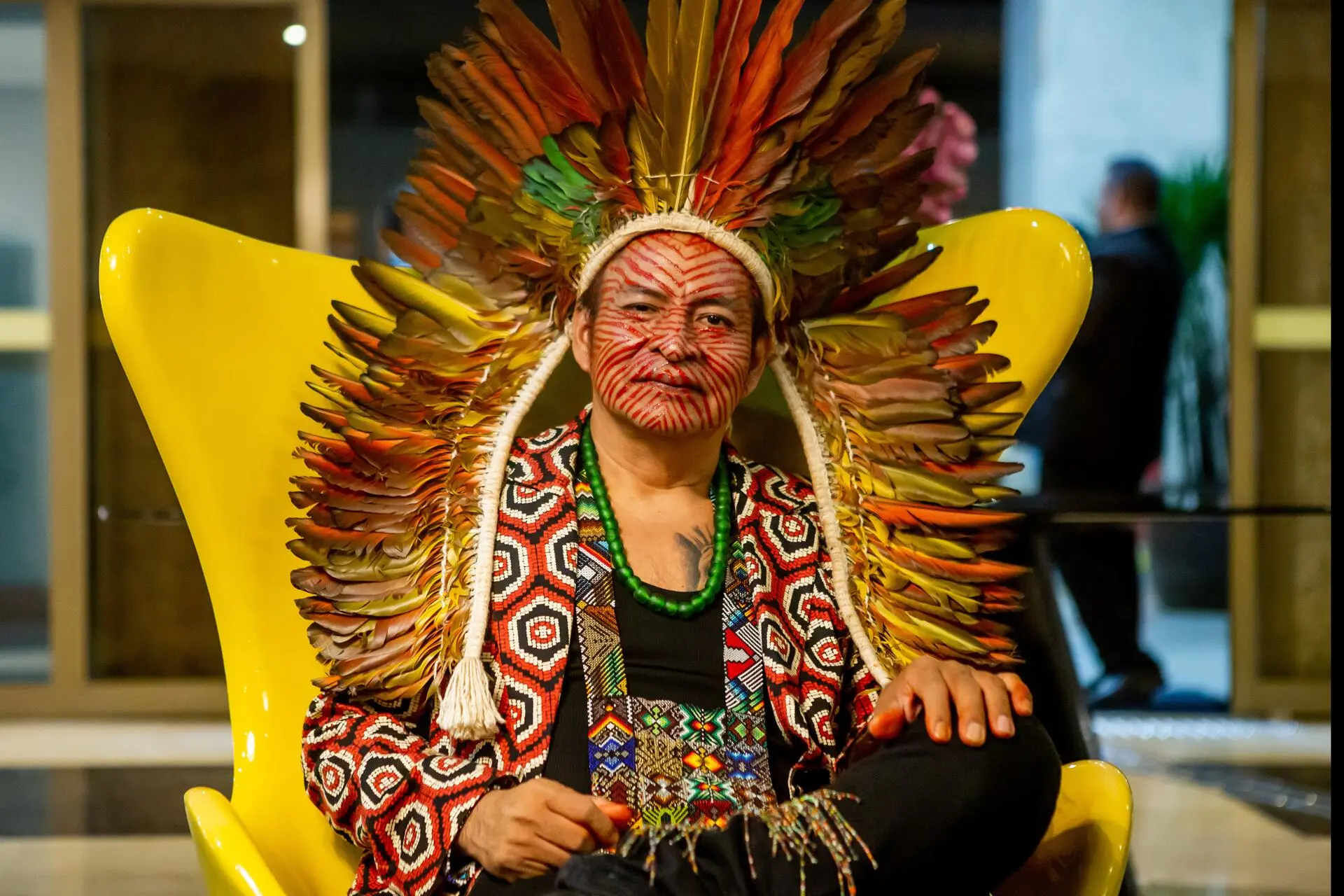
Tashka Yawanawá, leader of the Indigenous people who Alok says inspired a transformation in his life: “He was searching for himself”
Alok Achkar Peres Petrillo went to Rio Gregório Indigenous Territory in late 2015. Twenty-four years old at the time, Alok had already been named the best DJ in Brazil by an industry magazine, and only a few months later his hit Hear Me Now would blow up, turning him into the most streamed Brazilian artist on Spotify. “My goal was to record the ‘tribe’s’ songs and do an electronic remix [of them]. I never imagined this would be the most amazing journey of my life,” says Alok himself in a video about his trip to Rio Gregório. The word “tribe,” which he used at the time, is considered derogatory by Indigenous people.
This journey, he says, was the starting point for the first album of his career. Entitled O Futuro É Ancestral (The Future is Ancestral), its nine tracks mix Alok’s electro-pop with traditional Indigenous songs by the Guarani Nhandeva, Huni Kuin, Kaingang, Kariri Xokó, and Yawanawá peoples; with hip-hop by Owerá, a member of the Guarani Mbya who lives on the poor outskirts of São Paulo, Brazil’s largest city; and with the Brô MC’s, a group of young Kaiowá and Guarani from Mato Grosso do Sul. Also included is a powerful speech by activist Célia Xakriabá, a federal deputy with the Socialism and Liberty Party.
The album was released last year on April 19, Indigenous Peoples Day in Brazil, at an event carefully designed so as not to give the impression that Alok was promoting himself at the expense of the Indigenous musicians, beginning with the date and place: the Indigenous Peoples Memorial in Brasília. Journalist Geraldinho Vieira led a press conference where he was careful to direct a question to each of the seven Indigenous people seated around the DJ, before opening the microphone to the reporters present. Vieira, also known as Devam Bhaskar, a name given to him by controversial Indian guru Osho, is an experienced and respected journalist. He is also Alok’s uncle. He has, since its founding in 2020, helmed an institute named after the DJ that sponsors philanthropic work in Brazil and Africa.
“I was depressed at the time, looking for inspiration, when I came across the Yawanawá,” says Alok, 32. “For me, music was for making it to the charts. For Indigenous people, it was for healing. It was almost a calling.” He continues: “My role [on the album] is to empower Indigenous voices. It’s the most important project of my career, and it’s not about me.”
For the Indigenous people, Alok’s words sound sincere, and his attitudes are a sign of generosity. He says all proceeds from streams and album sales will go to the Indigenous people who took part. On the other hand, it’s reasonable to assume that Alok’s status – especially abroad – will grow because of his association with the Indigenous people. It already garnered him an award at the prestigious Cannes Film Festival, in France, in 2023.
The DJ’s association with the Indigenous musicians lends him an aura of respectability and of an artist sensitive to social and political issues. Brazil’s original peoples hold primary responsibility for conserving the country’s biomes, something urgent at a time when the climate emergency has already made its devastating power clear. Yet it seems Alok fails to understand the complexity of the cause he has embraced. And its powerful enemies.
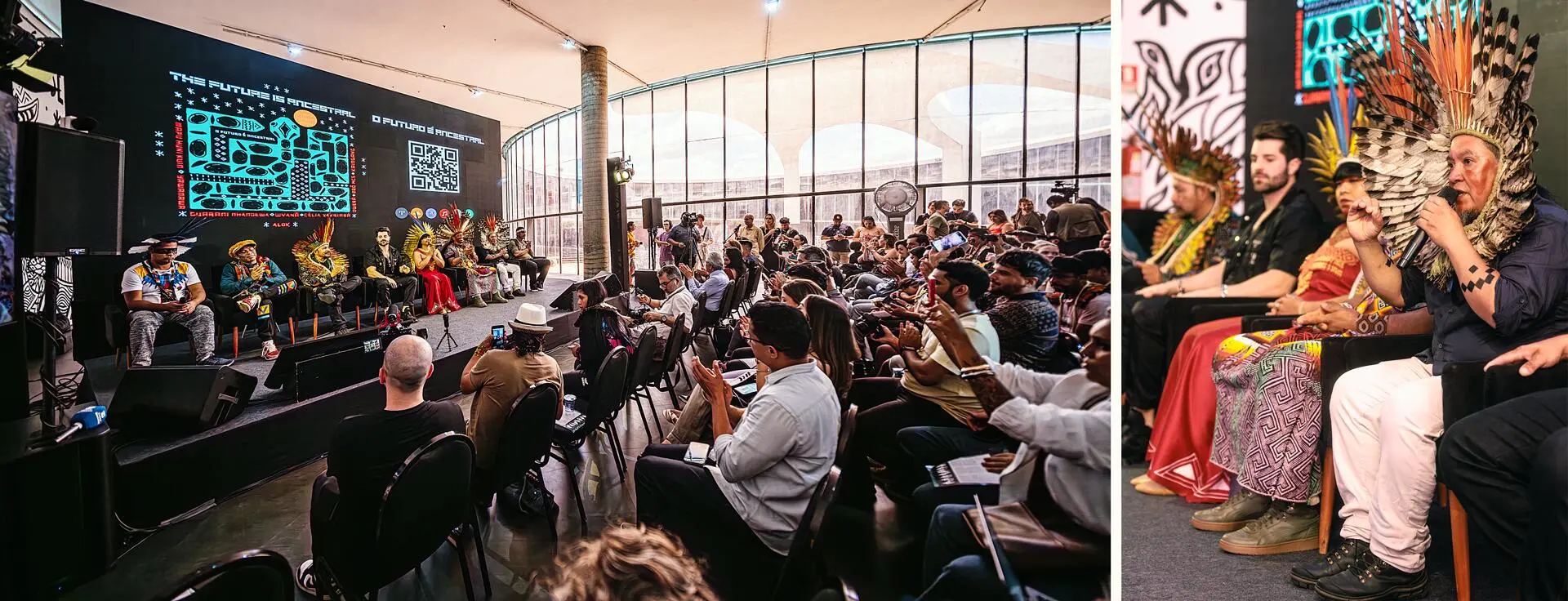
Album release for O Futuro É Ancestral at the Indigenous Peoples Memorial in Brasília: Indigenous musicians and Alok sat together on stage. Photos: Filipe Miranda
The climate emergency is ‘pop’
The day before Alok invited journalists to the Indigenous Peoples Memorial, President Luiz Inácio Lula da Silva had gathered the leaders of Brazil’s Indigenous peoples just a few miles away, at the Justice Ministry. They were waiting for an announcement that six Indigenous territories would be demarcated. Lula frustrated them by demarcating just two.
The president’s retreat bore the influence of large landowners who plant soybeans and raise beef cattle and of the agrochemical and ultra-processed food industries on hundreds of federal deputies and senators, Federal Supreme Court justices, and members of Lula’s own administration. “Agro,” as this group of players calls itself, is a steamroller in Brazil. It is responsible for most of the country’s exports. It has an insatiable appetite for more land. Too bad for anything or anyone who stands in its way – native vegetation, more-than-humans, the traditional forest communities known as Ribeirinhos, Quilombola communities of descendants of enslaved Africans, Indigenous peoples, climate security.
Because it so badly wants to convince us it’s pop too – Brazil’s biggest TV network, Globo, already says it is – agro is helping drive the careers of entertainers who extol the lifestyles of large landowners who raise soybeans and cattle. Alok is one of the stars of the Sertanejo Circuit, an itinerant tour of musicians who play this style of music across cities in Brazil.
The press conference for O Futuro É Ancestral is coming to a close when SUMAÚMA explains to Alok the extent of the landowners’ opposition to the Indigenous agenda and asks if he is afraid of being rejected by agro audiences. “I disagree. Everyone here lives with agribusiness, eats products from family agribusiness, from large-scale [agribusiness],” he replies. “If we start talking about enemies, it divides. And the big point is to unify. I have the good fortune of being able to move across multiple territories. It’s my great virtue.”
Threatened for singing the truth
The Brô MC’s are Bruno Veron, Clemerson Batista, Tio Creb, Kelvin Mbarete, and Charlie Peixoto. Members of the Kaiowá and Guarani Indigenous peoples, they are all around 30 and live on the Dourados Indigenous Reserve, an 11.5-square-mile area established over 100 years ago, where over 15,000 Indigenous people are now squeezed into two villages, Jaguapiru and Bororó. In reality, the reservation is part of the impoverished periphery of the second most populous city in Mato Grosso do Sul state.
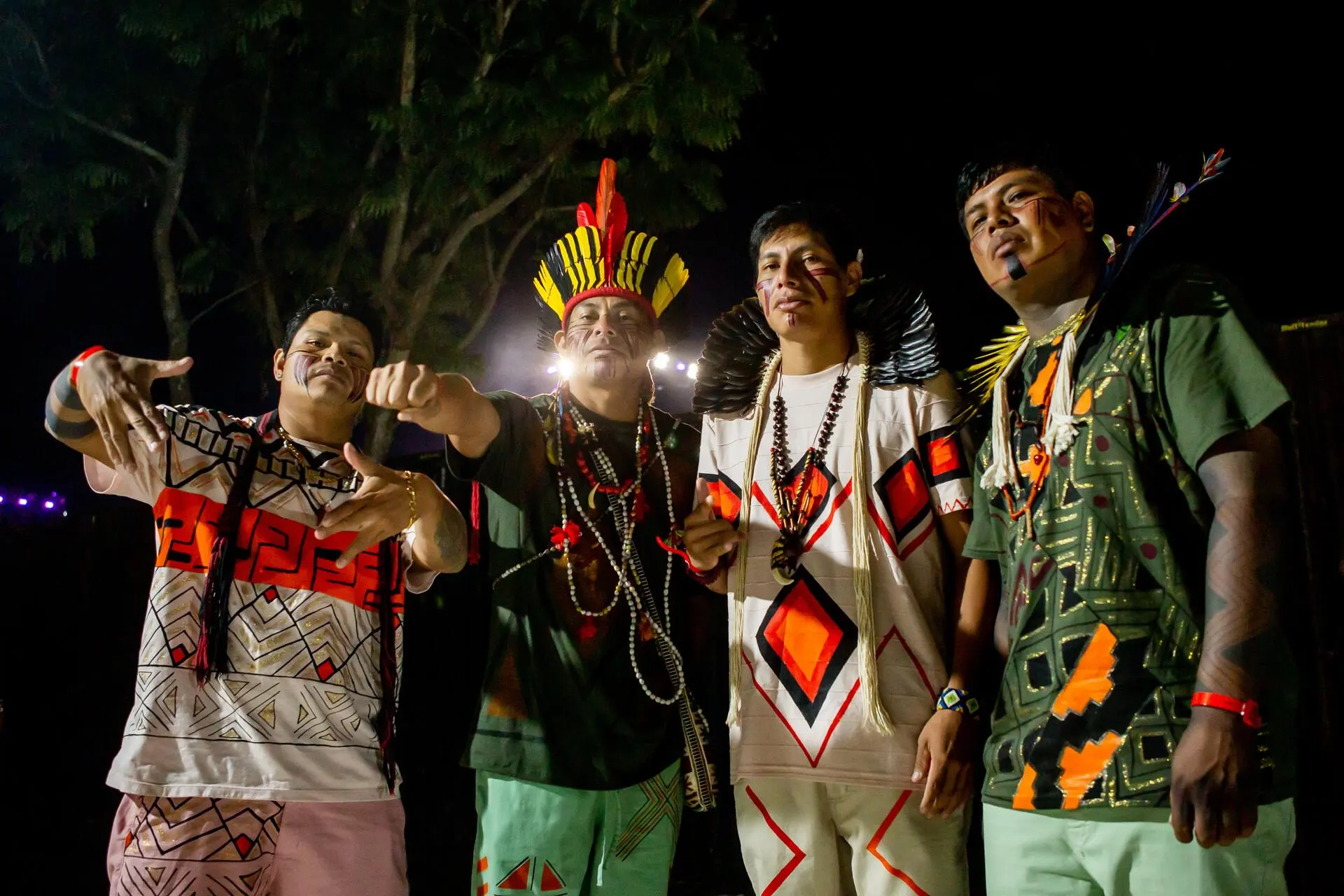
Tio Creb, Charlie, Kelvin, and Bruno – the Brô MC’s, who recorded with Alok – are targets of threats and racism in Dourados, the city where they live in Mato Grosso do Sul
As the reservation grows more overcrowded, the region’s Indigenous peoples have decided to fight for their traditional territories. “There are land returns near our village,” Bruno explains in a conversation with SUMAÚMA in Brasília. “Land return” meaning the re-occupation of territories that were Indigenous before they became landed estates. There has been a reaction. “The land-return leaders are killed. Their houses are burned,” says Kelvin.
A survey from the Socioenvironmental Institute published in 2021 shows that 77% of the land conflicts registered in the state from 2005 to 2019 occurred in areas where Indigenous people had taken back traditional territories. There are few regions of Brazil where so many Indigenous people die. Thirty-nine percent of murders of Indigenous people in Brazil from 2003 to 2019 and 64% of deaths of Indigenous people by suicide from 2000 to 2019 occurred in Mato Grosso do Sul. According to a United Nations documentary, there were 450 homicides and 700 deaths by suicide of Indigenous people in Mato Grosso do Sul from 2001 to 2016.
According to the Socioenvironmental Institute, rural properties exceeding 2,500 acres occupied 83% of the area of Mato Grosso do Sul in 2021. Yet many Indigenous people are landless, living in canvas tents along the sides of highways. They are killed, threatened, and assaulted for claiming ownership of less than 2% of the territory of Mato Grosso do Sul. A trifling amount in a state that used to be entirely Indigenous but a lot for agro, which wants every last square foot available.
Bruno and Clemerson are the grandchildren of a great Guarani-Kaiowá leader, Cacique Marcos Veron, murdered in 2003, when he was around 75 years old, after leading the land return of a cattle ranch. He was beaten and left to die along the side of a highway. The jury that heard the case cleared the three defendants of murder in 2011. Convicted only of torture and kidnapping, they were sentenced to 12.3 years in prison.
Brazil’s first Indigenous rap group, the Brô MC’s, emerged in 2009. To date, they have only played two shows in their hometown of Dourados. There were reports of threats against the musicians at both. At an event organized by the state government, they were prohibited from playing one of their songs, which claims that Mato Grosso do Sul “is made of the corpses of the Guarani-Kaiowá people.” The Brô MC’s see Alok’s proposals as sincere. Moreover, the famous DJ’s stamp of approval has given the group greater notoriety in their home region.
On O Futuro É Ancestral, the Brô MC’s sing the track “JAHARA.” Bruno, Tio Creb, Kelvin, and Charlie rap almost entirely in Guarani. As the song nears the end, there is a message in Portuguese: “Non-Indigenous, this one’s for you, oh/When sorrow and poverty walk side by side in a shack falling to pieces/Going hungry, no gas/Drinking nothing but dirty water/Holes in your clothes/And your dog at your side/Under the whip/Keeping us isolated.”
The 58th Expoagro trade show, promoted by the Rural Union of Dourados, an association of the city’s large landed estates, began last May 10. Alok was one of the opening acts at the event.
“He surrendered himself to the forest”
Just like the Brô MC’s, the other Indigenous participants on O Futuro É Ancestral who spoke to SUMAÚMA have no doubts about Alok’s sincerity.
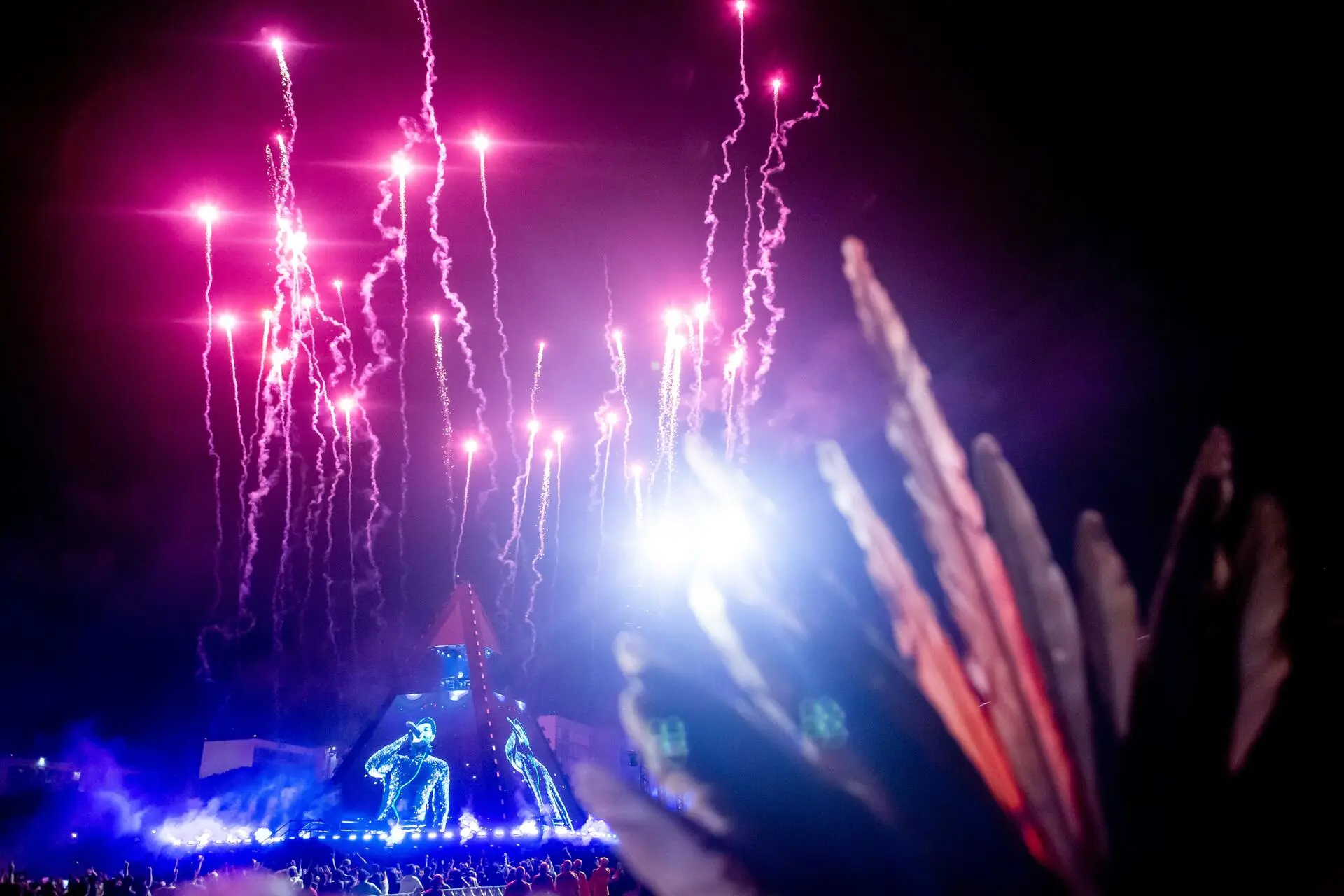
From the dressing room, an Indigenous person watches Alok atop the pyramid. During their performance, the Indigenous artists sang on a stage several feet below the DJ
“Alok was searching for himself,” Tashka Yawanawá told us. The main leader of the Yawanawá took part in the press conference, and the next day, on April 20, he also presented songs from the album at a show commemorating the 64th anniversary of the capital city of Brasília.
“I was amazed he went there,” said Matsini Yawanawá, the cacique, or leader, of Mutum Village, who welcomed Alok to the Rio Gregório Indigenous Territory in 2015. “That first night, we did a [shamanic] ceremony [with ayahuasca] and he went through a very intense process. He was overcome with emotion; he cried a lot. He surrendered himself to the forest; he took part in all the rituals we were doing. And then he began to ask about the songs. I answered: this one here is over 500 years old. It’s passed down from generation to generation.”
Mapu Huni Kuin became famous when he took part in a telenovela on the TV Globo network in 2023. He was 34. For his people, the Huni Kuin of Acre, he has been a central figure since before he was born. “When my mother became pregnant, my grandfather chose me as the spiritual leader,” he explained. Mapu said he had traveled around Brazil and to 17 countries, disseminating the sacred medicine (the Huni Kuin also use ayahuasca in their rituals), which he regards as “the cure for humanity.” Alok invited him to take part in the album after seeing him on the internet, singing along to an acoustic guitar during a shamanic ritual.
In O Futuro É Ancestral, Mapu sings “Yube Mana Ibubu,” a pop gem a little over two minutes long, turned into a potential hit by his powerful voice and earworm chorus. “He’s an important platform to bring our voice to the world,” Mapu says about Alok. The Huni Kuin spiritual leader currently lives in the Huwã Karu Yuxibu Center. It is an environmental preservation area that serves as a residence for Indigenous people living outside of the villages.
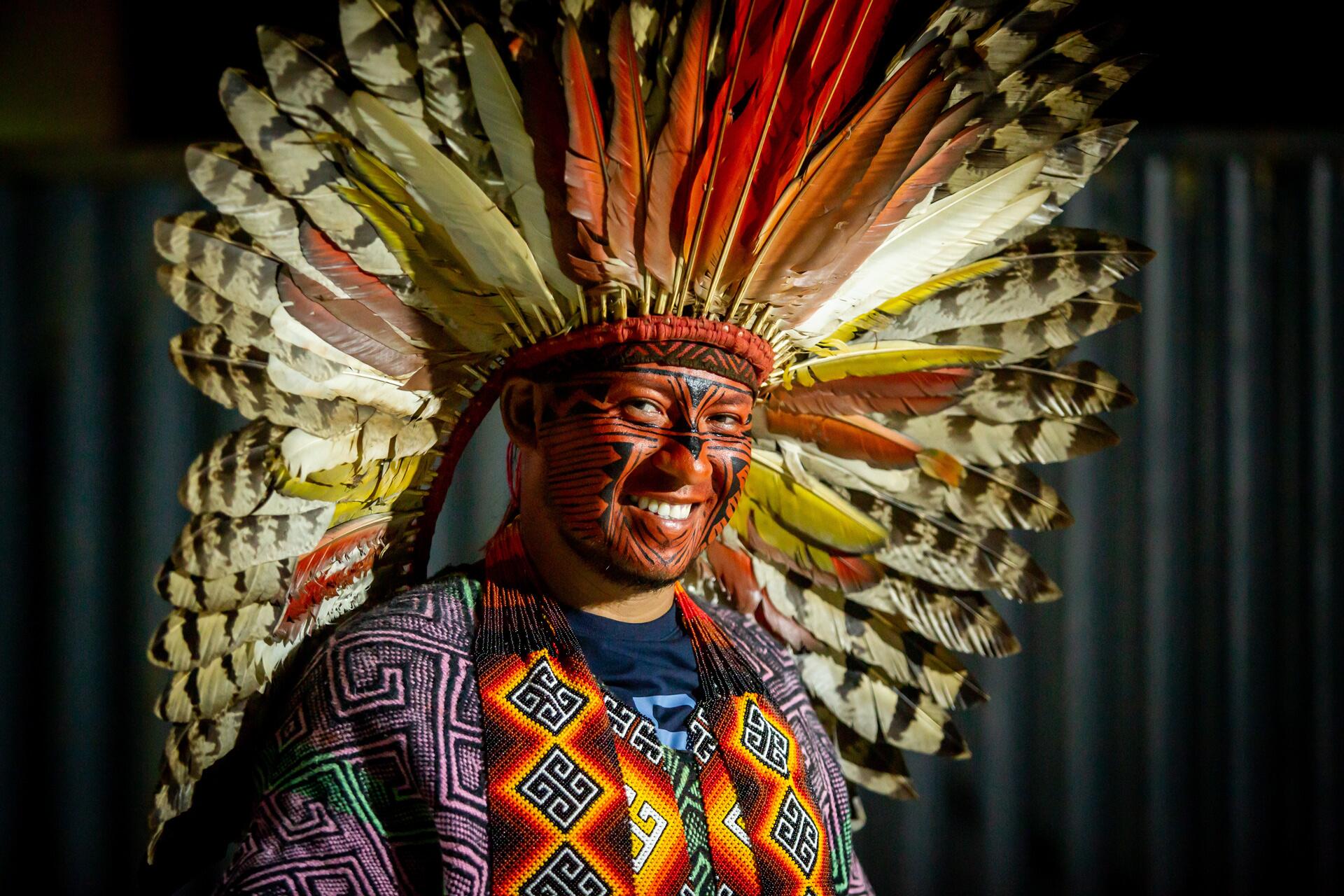
Mapu Huni Kuin, spiritual leader of his people in Acre and star of a TV Globo telenovela, is also featured on a potential hit song from O Futuro É Ancestral
The Alok Institute was founded in 2020 with a budget of BRL 38 million (roughly USD 7.4 million), some of which came from a payment the DJ received for taking part in an online video game. It paid for the construction of a kitchen, dining hall, and restrooms at the Huwã Karu Yuxibu Center. The institute was able to get a tractor dealership that supplies agribusiness to donate agricultural equipment to the Yawanawá village of Mutum. The institute is also supporting construction of a recording studio for the Brô MC’s on the Dourados Indigenous Reservation.
At the top and bottom of the pyramid
A few minutes past ten at night on Saturday, April 20, the estimated audience of 500,000 went wild as Alok strolled to the top of an immense pyramid set up in downtown Brasília. In their dressing room, Mapu Huni Kuin, Gwyrapadju Guarani Nhandeva, and Everton Guarani Nhandeva barely noticed the show was about to start. The three of them were dancing to the sounds of “Yube Mana Ibubu,” blasting out of a small portable speaker.
Everton, also known as Cacique Lalau, is the main leader of the Yvyporã Laranjinha Indigenous Territory, in southern Brazil. There, an estimated 300 Indigenous people live in an area of 3.86 square miles, too small for the Guarani Nhandeva to live according to their traditional culture. That’s why, in 2005, they reclaimed a nearby traditional territory, Posto Velho Village. In the process, the Indigenous people faced opposition from agribusiness.

Gwyrapadju Guarani Nhandeva helps paint Cacique Lalau Guarani Nhandeva: they are fighting agribusiness for territory where they can live according to their traditions
It is already into the wee hours of April 21 when Alok announces O Futuro É Ancestral and invites the Indigenous people to the base of the pyramid. Representatives from seven peoples take turns at the microphone, with the DJ providing backing for the songs. One after another, the Yawanawá, the rapper Owerá, Célia Xakriabá, the Brô MC’s, the Kaingang, and Cacique Lalau’s Guarani Nhandeva perform shortened versions of tracks off the album. The Kariri Xokó close the performance, which clocks in at exactly 15 minutes.
The excitement spills over into the Indigenous musicians’ dressing room, where they continue to sing and dance, hand in hand. It was short, but they delivered their message to half a million people and now they are celebrating together, joyful.
It is almost two in the morning when a van drops off a group that includes Cacique Lalau at a square in a central area of Brasília. There, they will sleep in tents and, starting on Monday, take part in the Free Land Camp, an annual march of Indigenous peoples to the capital. It will be an intense week and one with lots of bad news.
On Sunday morning, Alok will travel to Ribeirão Preto, where he will show off his hit factory on the Sertanejo Circuit. Days later, he will take part in a livestream with Pará’s governor, Helder Barbalho, a politician with the Brazilian Democratic Movement party, who tries to come off as a defender of the Amazon while supporting illegal small-scale mining, industrial mining, and oil exploration in the Foz do Amazonas Basin – all activities that threaten Indigenous people. In an apparently rehearsed and duly taped conversation, the DJ accepted Barbalho’s invitation to be an ambassador to the COP30 climate conference. “It’s time for us to tell the real story of how [the Amazon] really is,” Alok says. But to do so, he will need to understand that Indigenous rights and forest conservation have always been irreconcilable with the greed of large landowners.
Report and text: Rafael Moro Martins
Editing: Talita Bedinelli
Photo Editor: Lela Beltrão
Fact-checker: Plínio Lopes
Proofreader (Portuguese): Valquíria Della Pozza
Spanish translation: Julieta Sueldo Boedo
English translation: Sarah J. Johnson
Copyediting and finishing: Natália Chagas
Editorial workflow coordination: Viviane Zandonadi
News editor: Malu Delgado
Editor-in-chief: Talita Bedinelli
Editorial director: Eliane Brum















